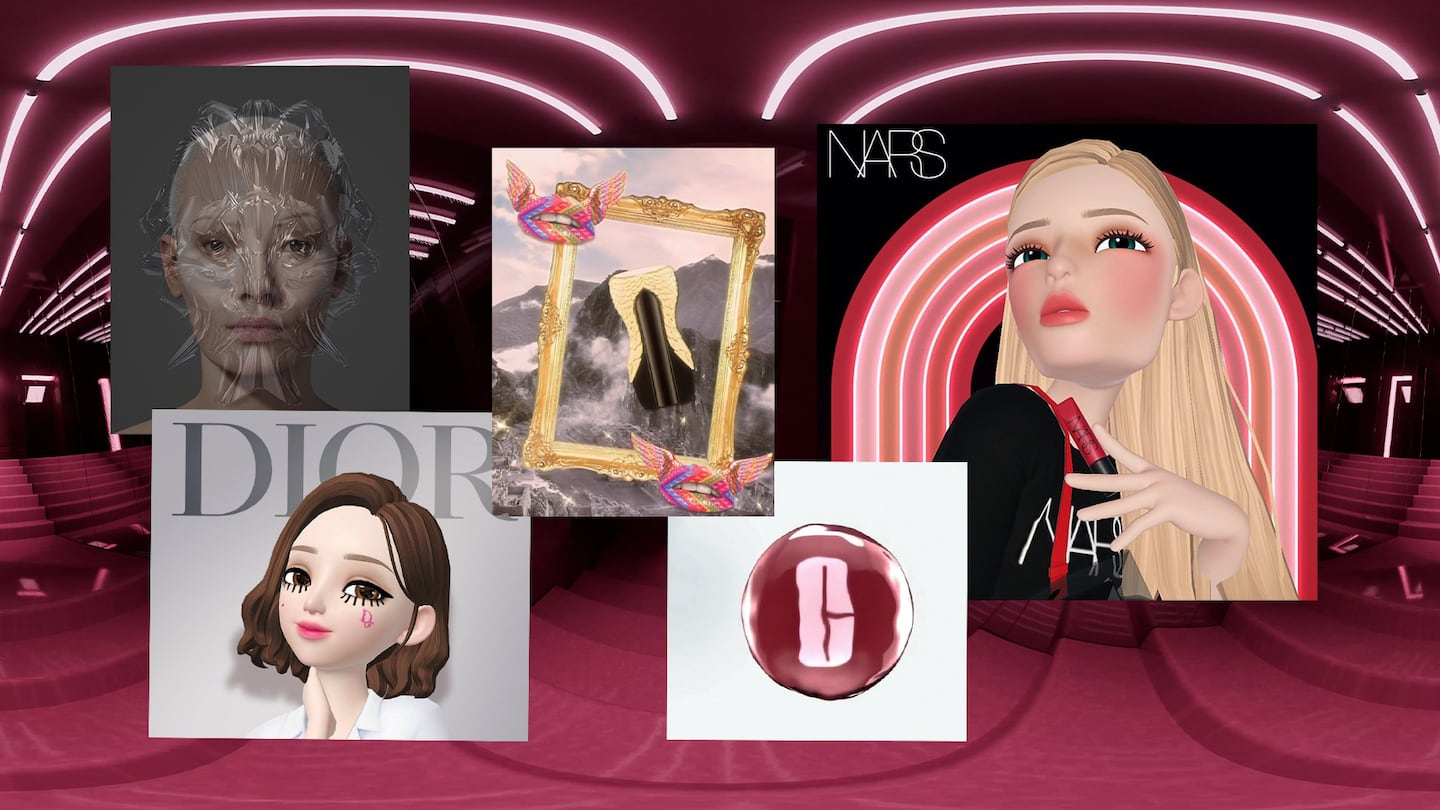
The Business of Fashion
Agenda-setting intelligence, analysis and advice for the global fashion community.

Agenda-setting intelligence, analysis and advice for the global fashion community.

Beauty’s next wave of tech innovation is happening in the metaverse.
Much attention has been dedicated to fashion’s activity in the space, from luxury brands like Gucci and Balenciaga launching experiences in online virtual worlds to labels like Etro and Dolce & Gabbana presenting collections at Metaverse Fashion Week.
But beauty has also been active: over the past two years, a number of brands, including Dior, Gucci, Clinique, Givenchy Parfums, Charlotte Tilbury, Nars and Guerlain have begun to embrace — or at least try out — the metaverse and web3, creating products for avatars and NFTs as well as virtual storefronts, experiences and games. In 2022 alone, L’Oréal filed 17 trademarks for virtual cosmetics and Estée Lauder partnered with Decentraland’s Metaverse Fashion Week.
Beauty and the metaverse share a number of qualities. Both are driven by a sense of fun and experimentation, said Audrey Depraeter-Montacel, managing director and beauty lead at Accenture. As well, the structure of communities in beauty, which are usually led by creators and the conversation they start with followers on social media, can easily translate to web3 spaces, where online discussion drives discourse.
ADVERTISEMENT
The beauty industry also has a history of being quick to adopt new technologies, such as augmented reality for virtual try-ons, and beauty consumers are used to seeing this sort of innovation from brands. Added to that, beauty purchases are hyper-personal, tied to identity and self-esteem and happen across a mix of physical and virtual channels that mimics the metaverse, says Depraeter-Montacel.
“Beauty is very much about creating worlds and an environment,” said Melissa Kelly, chief operating officer of creative agency M+A Group. “It ... lends itself to this kind of metaverse-and-NFT model.”
The potential for new revenue streams and methods for consumer engagement is there. But the metaverse is still underdeveloped. Brands, creatives, consumers and developers alike remain mostly in the dark about what exactly it will look like in the next few years — or even the next several weeks. Still, beauty brands recognise that it’s better to test it out than be left behind.
“It’s not going away, but how we use it is going to evolve,” said Kelly.
Beauty’s NFT Experiments
There are infinite possibilities for how beauty brands can show up in virtual spaces as identity and experience are stretched, said Alex Box, beauty futurist. Translating beauty into the metaverse isn’t as simple as creating digital counterparts for products. But that disconnect leaves more room for exploration, allowing brands to create digital products that tell a larger story about the brand or the product itself, she said.
For example, Box worked with Estée Lauder to build an NFT based on the company’s Advanced Night Repair product, tied to its March partnership with Metaverse Fashion Week. To create the piece, she thought about the product in its entirety — its history, ingredients and how the brand wants users to feel when they use the product, rather than just what it does. The resulting NFT wasn’t just a digital copy of the product’s packaging but acted as a filter that coated owners’ avatars in a glowing radiant effect.
“Instead of it being binary in its depiction, you could enter into the essence of what it is,” said Box. “You’ve got this 360, immersive communication tool that you didn’t have before.”
ADVERTISEMENT
In getting started, brands should consider building their own virtual storefronts, which can be built on the blockchain or off, said Jordan Robinson, MA + Group’s director of metaverse. (MA + Group helped build virtual storefronts for Kylie Cosmetics and Armani Beauty.) This can also help brands avoid betting on one nascent platform.
Another potential first step is launching NFTs linked to loyalty schemes — which Kelly said have huge potential for building community in beauty specifically. Clinique did just that in 2021, giving winners of a contest a molecule-shaped NFT based on its Moisture Surge moisturiser and Black Honey Lipstick products. Along with the NFT, the new token owners received an assortment of physical products every year for a decade. Clinique saw a 60 percent rise in search traffic and 20 percent increase in social engagement following the debut, WWD reported in February.
The tactic has potential in indie beauty, too. Margarita Arriagada, founder of lipstick brand Valdé, saw NFTs as a way to find people who were loyal to and understood her luxury brand, whose lipstick starts at $199. Those who purchased a $1,200 special edition quartz-encased lipstick received a corresponding NFT and invitation to an online community, Valdé NFT Collective, which unlocks access to perks like a one-year supply of one lip shade, membership in Discord channels and special events.
Brands can also take what they learn in the metaverse and apply it to product development, said Gabe Miller, president of brand consultancy Landor & Fitch North America. British perfume brand Rook’s NFTs, for example, gave 30 customers access to a DAO (a decentralised autonomous organisation, which is a collective where members share ownership and participate through blockchain-based tokens) that, over the course of six months collaborated on the development of a new fragrance called “The Scent of the Metaverse,” now sold on Rook’s site; DAO members receive a portion of sales.
“You can use how people are expressing themselves in this world to see a trend that might be popping up,” said Miller.
Brands can also use NFTs and the metaverse to widen a consumer’s experience with the brand itself. Nars, for instance, launched an Animal Crossing partnership in January 2021, then an NFT based on its Orgasm Blush product that July and a project with avatar-based game Zepeto in September that tied the debut of a collection of virtual goods, including virtual makeup looks, shirts and roller skates, to the launch of its blush. The roller skates ended up being one of the best-selling items in the experience.
At the time, Nars just wanted to build brand awareness in the gaming world. Now it sees a real opportunity in making tools to enrich digital identities and foster creativity outside the bounds of reality. The brand is launching its first-ever fully immersive metaverse experience at the end of June. That has offline implications too.
“What happens in that metaverse app environment doesn’t necessarily stay there,” said Dina Fierro, Nars vice president of digital strategy and social engagement, who foresees a world in which brands have their own locations on every metaverse platform, just as they do on social media.
ADVERTISEMENT
“We’re really at the beginning of an entirely new age of digital experience,” she added. “We see this as an opportunity to push the boundaries of consumer engagement.”
Beauty’s Virtual Future
As brands grapple with how to use the “newest arrow in [their] quiver,” as Miller calls it, he suggests they start by considering their own goals and objectives as a guide to why and how they should appear in metaverse spaces.
“It’s an important time for every brand to rethink what their purpose for being is,” said Miller. “What are they really trying to do? It’s an opportunity to reset and really crystalise what’s important to them.”
Then, in developing their strategy, brands need to hire people who understand both the long and short-term possibilities and limitations of different platforms, said Box.
“You don’t have to just do a digital double of a real-world product. We are actually moving into a space where you have the chance to rewrite the script,” she said. “It’s about having somebody on the team that understands the semantics.”
Development of the metaverse is early days, but waiting around means missing out on learning opportunities and relationship building. Brands shouldn’t just enter the metaverse because it’s an interesting prospect, but rather, because that’s where consumers already are and conversations are already happening.
“Beauty brands need this audience,” said Depraeter-Montacel. “This is their target.”
Editor’s Note: This article was updated on 25 May 2022. A previous version stated Melissa Kelly is a partner at M+A Group. That is incorrect.
NFTs, video games and virtual experiences are giving fashion businesses new tools to build the fantasy around their brands and products.
NFTs right now look both like an opportunity fashion brands are just starting to tap and a short-lived fad already entering terminal decline. Which is it?
With the past year’s flurry of tech-focused mergers, acquisitions and partnerships, the beauty industry increasingly resembles Silicon Valley. But the bets on beauty tech are just beginning.

Joan Kennedy is Editorial Associate at The Business of Fashion. She is based in New York and covers beauty and marketing.
TikTok has birthed beauty trends with very little staying power. Despite this reality, labels are increasingly using sweet treats like glazed donuts, jelly and gummy bears to sell their products to Gen-Z shoppers.
This month, BoF Careers provides essential sector insights to help beauty professionals decode the industry’s creative landscape.
The skincare-to-smoothie pipeline arrives.
Puig and Space NK are cashing in on their ability to tap the growth of hot new products, while L’Occitane, Olaplex and The Estée Lauder Companies are discovering how quickly the shine can come off even the biggest brands.